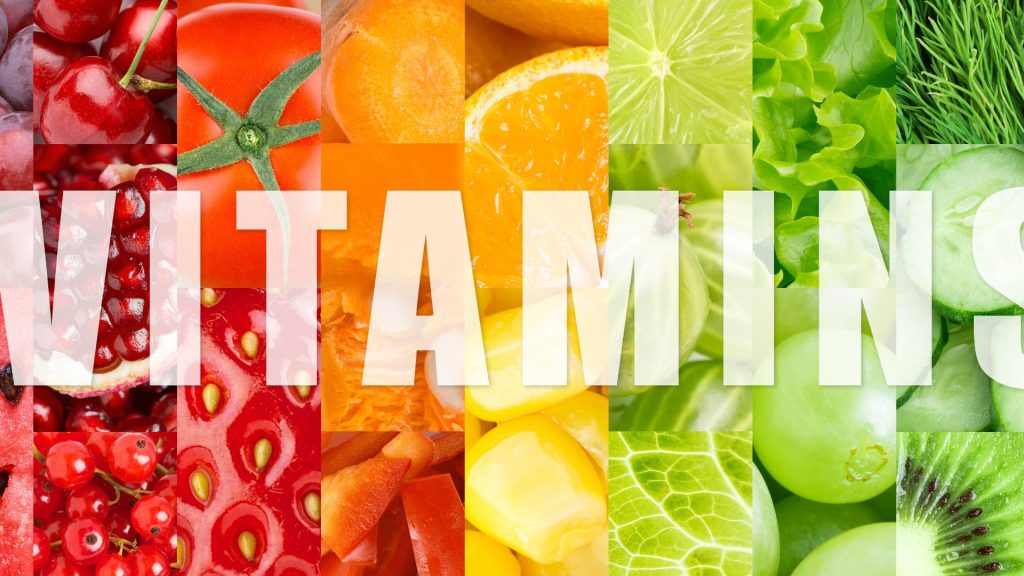Vitamins are chemical compounds found in food that your body requires to function and grow properly. Vitamin A strengthens bones while supporting immune systems. Blood clotting requires certain vitamins.
There are thirteen vitamins — water-soluble ones such as B vitamins (eight in total and C) as well as fat-soluble ones like A, D, E and K). Water-soluble vitamins don’t last very long in the body before leaving through urine.
Vitamin A
Vitamin A is a fat-soluble vitamin that supports eye and skin health while simultaneously aiding immune function and decreasing infection risk.
Vitamin A can be found in meat, fish, poultry and dairy products as well as fruit and vegetables where it appears either as preformed retinol (retinyl palmitate or retinyl acetate) or its precursors beta-carotene, lycopene and lutein. Furthermore, many supplements also provide this nutrient.
Vitamin C
Vitamin C is an essential nutrient, providing antioxidant and immunity-enhancing effects. Furthermore, it contributes to collagen production – essential in creating skin and blood vessel structures.
EPIC-Norfolk prospective cohort study found that higher plasma vitamin C concentrations were linked with lower rates of heart failure; however, randomized clinical trials have not conclusively established whether vitamin C supplements can protect against cardiovascular disease.
Vitamin D
Vitamin D plays an essential role in calcium absorption and bone development and remodeling, helping prevent both rickets in children and osteomalacia in adults.
Clinical trials examining vitamin D supplementation have demonstrated that serum 25(OH)D levels rise with intake; however, this relationship varies by life stage and duration of supplementation; higher baseline 25(OH)D levels do not appear to decrease cancer mortality rates.
Vitamin E
Vitamin E, a fat-soluble vitamin found in plant oils and food sources, acts to protect the body against oxidative damage while supporting immunity, cell signaling, immune function and signal transduction. Natural (d-alpha tocopherol) and synthetic (dl-alpha tocopherol) forms are both available.
Studies demonstrate that an adequate intake of vitamin E may help protect against heart disease. Furthermore, it has been found to lower levels of the enzymes ALT and AST for those suffering from nonalcoholic fatty liver disease.
Vitamin K
Vitamin K is a fat-soluble vitamin essential for blood clotting and bone health, found primarily in leafy green vegetables and vegetable oils.
Numerous observational studies have linked low vitamin K intake with an increased risk of osteoarthritis (116, 117). One longitudinal study demonstrated this correlation when individuals who began out with very low plasma phylloquinone concentrations advanced more quickly through knee osteoarthritis.
Vitamin B1
Thiamine (vitamin B1) helps the body turn food into energy. It’s found naturally in meat, beans, and fortified bread products but can also be taken as a supplement.
Thiamine is essential to glucose metabolism and nerve, muscle, and heart function. As our bodies cannot store thiamine for later use, deficiency causes beriberi – an illness with heart, nerves, digestive and neurological effects – as well as possible beriberi deficiency symptoms.
Vitamin B2
Riboflavin (Vitamin B2) is one of the eight essential dietary vitamins. Like Vitamin B12 (cobalamin), Riboflavin helps fuel energy production, maintain cell health, and provide antioxidant defenses against free radical damage.
Vitamin B2 plays an essential role in breaking down proteins, fats and carbohydrates within our bodies. Good sources include calf’s liver, almonds, milk, brewer’s yeast, crimini mushrooms, whole grains and kale; it may also be found in some dietary supplements. Vitamin B2 deficiency is rare.
Vitamin B3
Vitamin B3, commonly referred to as niacin, is part of the B vitamin family and can be found both in foods and as a dietary supplement.
Niacin helps improve blood flow by dilatation of the blood vessels and decreasing cholesterol and triglyceride levels. Additionally, this substance reduces triglycerides.
Water-soluble vitamins cannot be stored by your body; you need to consume it daily as part of a healthy lifestyle. They are found both naturally in foods as well as fortified products.
Vitamin B5
Pantothenic acid, better known as vitamin B5, plays an integral part in maintaining proper nerve health. It helps the production of an important neurotransmitter called acetylcholine which sends nerve signals throughout our bodies including our brain and other organs.
Vitamin B5 helps produce coenzyme A and plays an essential role in energy-yielding metabolism, making up part of its daily nutritional requirements for humans and animals alike. You’ll find vitamin B5 found in most plant and animal food sources.
It appears to reduce “bad” cholesterol and triglycerides while increasing “good” cholesterol.
Vitamin B6
Vitamin B6 (pyridoxine) can be found both naturally in many food items and supplement forms. [1]
Studies suggest that adequate levels of Vitamin B6 may help lower blood sugars that could eventually lead to diabetes. Furthermore, B6 is required for producing neurotransmitters that regulate mood; its use has been found to alleviate PMS symptoms as well as depression in premenopausal women.


